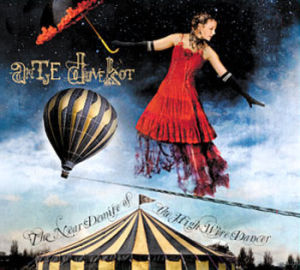Reviews
Review - Sing Out! - The Near Demise of the High Wire Dancer (Summer 2009)

"The Near Demise of the High Wire Dancer qualifies Duvekot for her place among the most notable contemporary singer-songwriters"
Sing Out! Magazine
Few CDs grab you by their very title as quickly as this highly original opus. Even better, the title is not obscure, but immediately reinforced by Duvekot's first song, "Vertigo," which works its way around that imagery. There are nine original songs, one co-authored with Seamus Egan, and a song in German by former East German children's songwriter Gerhard Schöne, to whom Duvekot attributes her love of music. I reviewed an early effort by Duvekot in these pages a number of years ago, and commented on her lack of polish and professionalism. She has grown rapidly into this solid, highly professional recording, in content and performance. This also is a very rare case of Richard Shindell, one of the foremost singer-songwriters, producing a CD. He fully understands what Duvekot is trying to say and appropriately sets the stage, frequently playing guitar and singing harmony in this fully produced recording. Shindell invited a few of his friends to participate, including Lucy Kaplansky and John Gorka. Duvekot writes lengthy, complex songs that effectively employ vernacular poetry. Shindell provided each song a unique production. Most of the songs relate in a symbolic and spiritual way to the title of the CD. It's the journey of a young person through the world trying to strike a balance and afraid of falling. Titles such as "Long Way," "Lighthouse," "Dublin Boys," "Scream," "Reasonland," "Coney Island" and "Merry-Go-Round" illustrate this point. "Long Way" is Duvekot's On The Road, and she even mentions Kerouac at the end of the song, which relates her "long, long, long, long way" through America in her engrossing journey. "Reasonland" is the most political composition, and it is one of the stongest songs on the CD. It touches a lot of current nerves. An interesting aspect of Duvekot's writing is that nearly every song contains one killer line that lights up in the rest of the song like a strobe flash. My only quibble would be for more melodic variation. The Near Demise of the High Wire Dancer qualifies Duvekot for her place among the most notable contemporary singer-songwriters. --- RWarr
Sing Out! Magazine
Few CDs grab you by their very title as quickly as this highly original opus. Even better, the title is not obscure, but immediately reinforced by Duvekot's first song, "Vertigo," which works its way around that imagery. There are nine original songs, one co-authored with Seamus Egan, and a song in German by former East German children's songwriter Gerhard Schöne, to whom Duvekot attributes her love of music. I reviewed an early effort by Duvekot in these pages a number of years ago, and commented on her lack of polish and professionalism. She has grown rapidly into this solid, highly professional recording, in content and performance. This also is a very rare case of Richard Shindell, one of the foremost singer-songwriters, producing a CD. He fully understands what Duvekot is trying to say and appropriately sets the stage, frequently playing guitar and singing harmony in this fully produced recording. Shindell invited a few of his friends to participate, including Lucy Kaplansky and John Gorka. Duvekot writes lengthy, complex songs that effectively employ vernacular poetry. Shindell provided each song a unique production. Most of the songs relate in a symbolic and spiritual way to the title of the CD. It's the journey of a young person through the world trying to strike a balance and afraid of falling. Titles such as "Long Way," "Lighthouse," "Dublin Boys," "Scream," "Reasonland," "Coney Island" and "Merry-Go-Round" illustrate this point. "Long Way" is Duvekot's On The Road, and she even mentions Kerouac at the end of the song, which relates her "long, long, long, long way" through America in her engrossing journey. "Reasonland" is the most political composition, and it is one of the stongest songs on the CD. It touches a lot of current nerves. An interesting aspect of Duvekot's writing is that nearly every song contains one killer line that lights up in the rest of the song like a strobe flash. My only quibble would be for more melodic variation. The Near Demise of the High Wire Dancer qualifies Duvekot for her place among the most notable contemporary singer-songwriters. --- RWarr